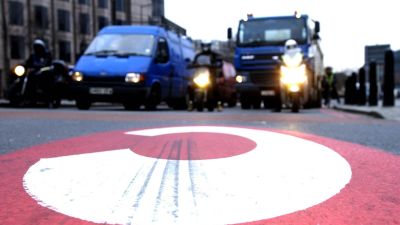Shorter hours, 50 free days, exemptions: What are the changes to the Cambridge congestion charge?

Proposals for a congestion charge in Cambridge have been scaled back after an outcry from locals - with the tariff now only being enforced at peak times.
The Greater Cambridge Partnership has revealed its new plans after assessing the results of a consultation that showed more than half of respondents were opposed to the charge.
Under the new plans, the 7am to 7pm enforcement of the charge has been scrapped, and instead it will only apply from 7-10am and 3-6pm.
The cost of the charge - £5 for cars, £10 for vans and £50 for HGVs and coaches - remains the same.
The GCP said the revised plans would "reduce the charge’s impact on people who live and work in Cambridge".
Its first consultation showed 70% of respondents wanted cheaper, greener and healthier ways to get around Greater Cambridge, and were in favour of a better and lower-cost bus network, along with walking and cycling infrastructure to offer alternatives to the car.
But 58% of people said the congestion charge was the wrong way to do it, and the GCP has now revised its proposals.
Here are the changes to the proposals:
Weekday peak hour charging: The charge will only apply from 7-10am and 3-6pm. The GCP said charging at peak times would have the biggest impact on reducing congestion, adding: "This allows greater freedom for people to move around, and, for example, deliveries to be received in the middle of the day. Peak time charging also substantially reduces the impact on small businesses and the self-employed."
Earlier finish: The charging period will end earlier at 6pm, instead of 7pm, to encourage evening social, caring and leisure activities.
50 free days: Car users will receive an allowance of 50 free days. "Whether for a weekly big shop, early morning appointment or days grouped together for hospital visits," said the GCP. "These free days for private car users are fair to all - giving everyone a chance to use their car without charge on the occasions they really need it.
Business discount: Locally owned small and medium-sized enterprises (SMEs) will receive a 50% discount on heavy goods vehicles and vans "to support local businesses who rely on vehicles to trade".
Low-income discounts: Reductions of 50% for those on low incomes, "to make the STZ fair to those on lower incomes who rely on their cars".
Exemptions: Most people who need to go to hospital by car will not need to pay "matching the parking allowances that the hospitals make for patients, visitors and staff". Those who receive carers benefit and mobility PIP will also be exempt.
Motorbikes go free: Motorbikes are now exempt from the charge - which had been proposed at £5 a day - under the new plans.
Chief executive Rachel Stopard said the GCP had listened to feedback and "taken action".
“Greater Cambridge needs to tackle the congested roads, fund more electric buses and new, reliable and cheaper services.
"Although the updated measures are not the preferred option that we presented originally, we believe that the revised proposal is fair to everybody – those on a low income, small businesses, families, people accessing healthcare and workers and residents who simply want to be travel around Cambridge without being stuck in congestion.
"We aim to provide a cleaner, greener and healthier future for all.”
She added: "This is a once in a lifetime opportunity to future-proof our public transport network and reduce our dependency on the car by creating a low-cost, secure, reliable and viable option for residents, workers, students and visitors who want to quickly and easily get around our beautiful city."
Want a quick and expert briefing on the biggest news stories? Listen to our latest podcasts to find out What You Need To Know...